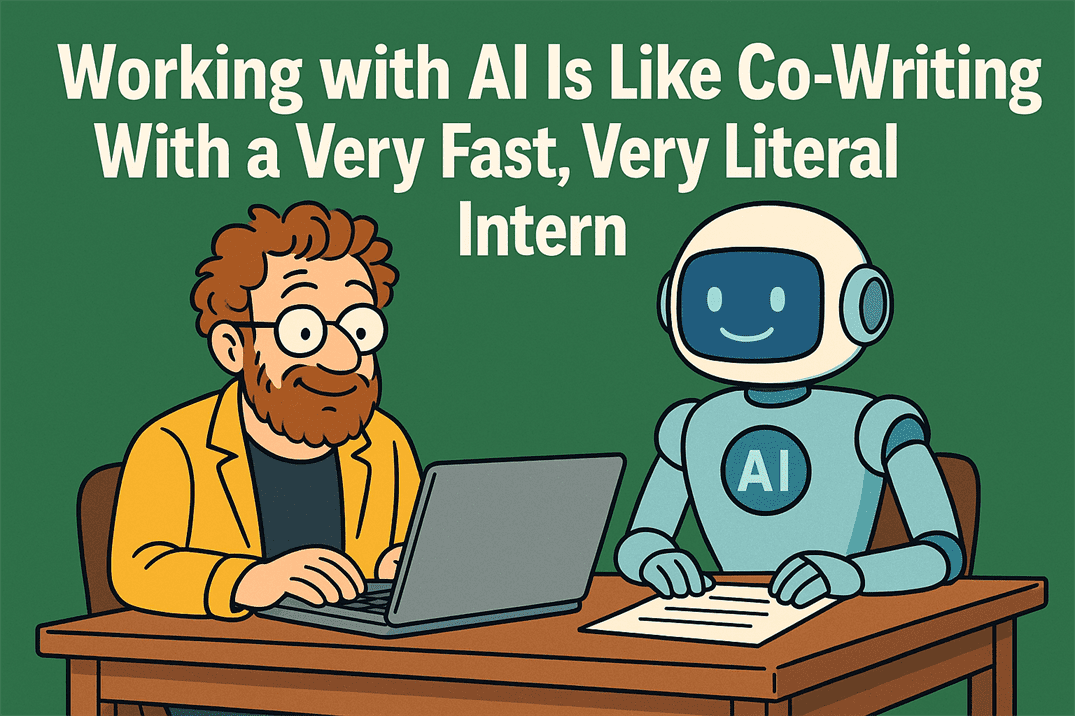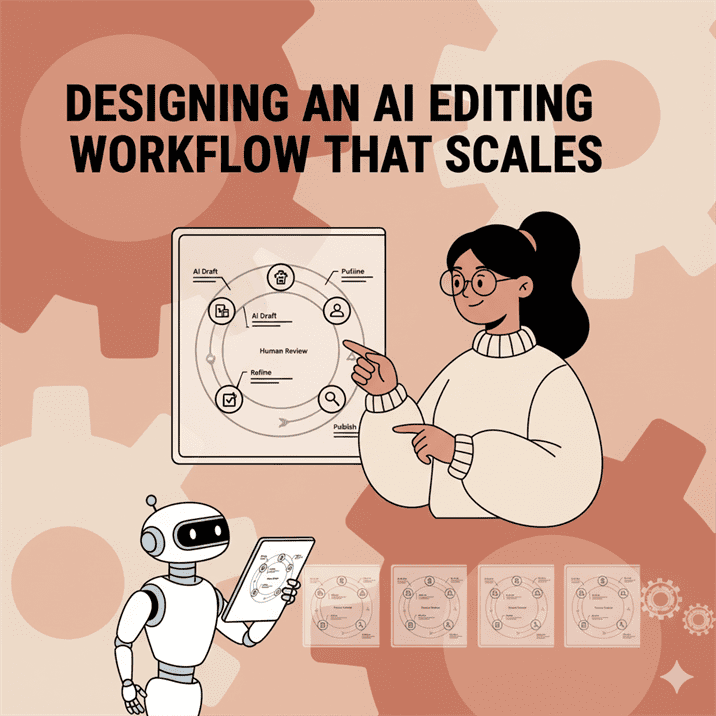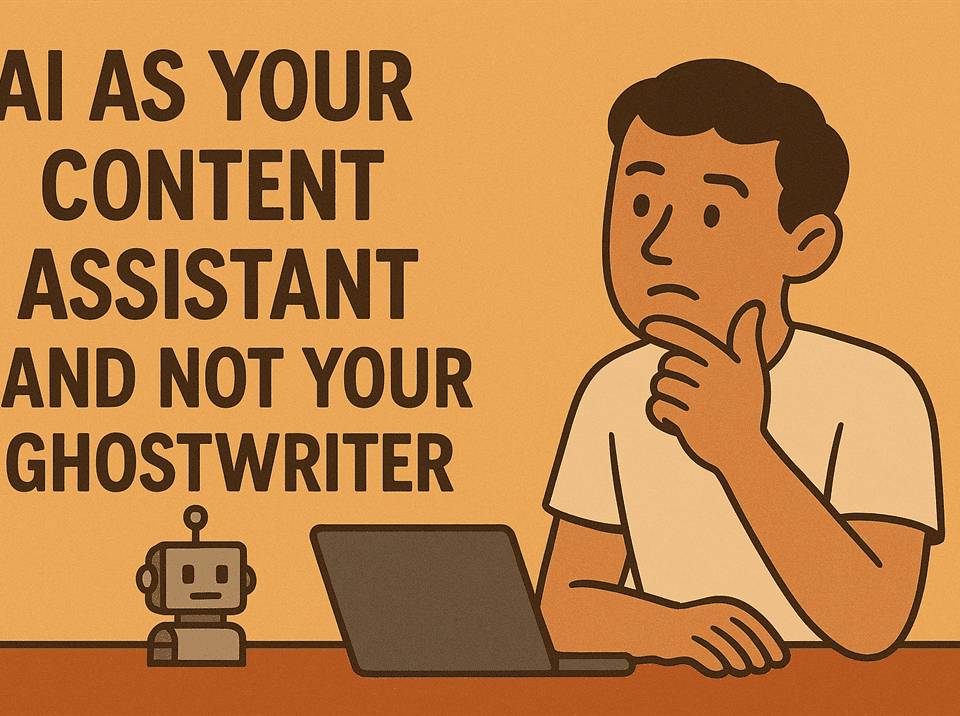Working with AI is like co-writing with a very fast, very literal intern

Alright, picture this: You’re sitting at your desk, hot coffee in hand, ready to dive into your latest piece of content.
Suddenly, an intern bursts through the door. They’re young, eager, and they’ve got oodles of potential.
You think to yourself, “Hey, this could be the one! The intern that actually gets it.”
You hand them a task, and they promise they’ll have it to you in 15 minutes.
You’re intrigued. You’re excited. You’re… in for a wild ride.
This intern, let’s call them AI, takes your instructions. They don’t need to ask questions. They don’t need coffee breaks. They just go.
You get a finished draft back in minutes, practically glowing with the promise of productivity.
It’s fast, it’s efficient, and at first glance, it looks like a solid start.
But then you start reading it.
And that’s when you realise: this intern is a little too literal.
The promising start
“Please write a blog post about how to use AI for content creation, with a focus on improving productivity and saving time,” you say.
Simple, right?
AI nods, spits out an essay like a machine at full throttle.
You skim through it. It’s coherent, the grammar’s on point. But… wait. What’s this? A 200-word section on how to click on a link?
Another 100 words explaining that “AI is fast” and “AI saves time”?
Oh, and this little gem: “The internet is full of websites.”
Now you’re sitting there, scratching your head, wondering if you just asked your intern to write for a toddler.
Sure, it’s fast, but it’s also basic.
Guiding the intern
So, you go in with a red pen (or, in this case, a prompt). You gently guide the intern back on track.
You know they mean well, but they need a little direction.
“Try again but focus more on specific strategies for integrating AI into content workflows. Make it more detailed, add some actionable advice. Also, less on the obvious stuff, like clicking on links. I think our readers already know how to do that.”
You know how it goes. You have to give a little nudge here, a little redirect there.
You get a second draft, and it’s much closer to the mark.
AI even throws in a couple of examples, references, and quotes to make it sound like it’s read a few blog posts on the topic.
You’re almost there… except for one thing.
The tone.
It’s like your intern’s still trying to write the world’s most formal memo, even though you specifically asked for conversational and witty.
It’s the corporate equivalent of saying “Please, pass the salt” in a boardroom, eager, but a bit off.
Redirecting puppy energy
You try again. “Can you make this sound more like a chat between colleagues? Less ‘Dear Sir or Madam,’ more ‘let’s get this done, mate.’”
A few more tweaks, and now AI is starting to catch the vibe.
The voice is warmer, the suggestions are sharper. It’s like getting that intern to stop writing in their best “official report” tone and finally letting them relax a bit.
Still, there’s always that one last hurdle. The facts.
While AI is great at generating ideas and structuring content, it sometimes drops the ball on accuracy.
One paragraph talks about the “proven benefits of AI content creators,” only for you to find that the studies it cites don’t quite exist.
So, back to the intern: “Okay, we need real sources. Actual stats. Let’s fact-check before we make any bold claims.”
And then it hits you: this isn’t an intern at all. It’s a tool.
A tool that can work at lightning speed but still needs a human to make sure it doesn’t accidentally publish a piece claiming that AI wrote the Mona Lisa.
The polishing stage
Finally, after guiding, redirecting, tweaking, and polishing, you’ve got something ready to go.
It’s a solid blog post. It’s sharp. It’s got personality.
And while you didn’t write every word yourself, you were there every step of the way, crafting it, refining it, giving it that final spark of genius (let’s be honest, it’s your spark, not AI’s).
Here’s the thing: AI is amazing. It’s like working with the intern who’s got the job done but needs a little handholding to make sure it’s done right.
The results can be incredibly fast, the ideas are there, but the final product? It needs that polish. That finesse.
The nuance that only a human editor (read: you) can bring.
Final thoughts
Of course, this post deliberately ignores prompt engineering and the hundreds of Reddit posts showing incredibly complicated prompts that can deliver (occasionally) better results.
While Reddit is great, there are millions and millions of people who don’t use it. Why, I don’t know, but it’s a thing apparently.
So this post is for all of you.
In the grand scheme of things, AI isn’t ready to take over your job, but it is ready to be your very, very fast intern.
And like any intern, it needs guidance, redirection, and someone to make sure that what they hand in isn’t the corporate equivalent of a broken stapler and an unreadable spreadsheet.
But hey, once you get it to a place where it actually sounds human, you realise it’s a great assistant.
Maybe a bit too literal, a little rigid, but powerful in the right hands.
As long as you’re there to step in when things go a little sideways, working with AI could just be the most productive co-writing gig you’ll ever have!



